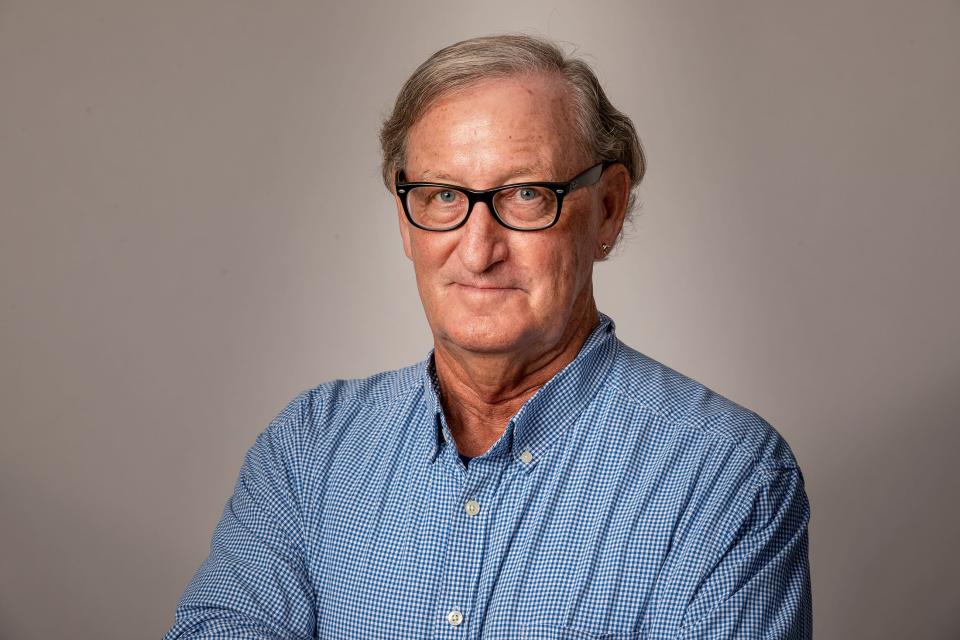Where governing and campaigning collide: Can We Get It Together? | Bruce Anderson

- Oops!Something went wrong.Please try again later.
Look, I get it. It’s an election year, and we’re all feeling our partisan oats.
Maybe there’s nothing to be done about the tone and tenor of the political narrative, which, to me, so often sounds like a three-ring circus … on fire. I refuse to get very excited about “fake news,” or lies or weird claims during campaigning. Those who believe fabricated nonsense masquerading as “fact” deserve what they get.
Have we just discovered lying in politics – at election time? Or actually wonder that some candidates may be bending the truth a bit? Sorry, that’s like Claude Rains wandering into a black-market casino in the classic film “Casablanca” and feigning horror that “there’s gambling going on in here” (of course, he then sits down at the blackjack table and asks to be dealt in).
Most politicians, and candidates for office are, or aspire to be, dedicated public servants doing a job few of us would want. We may disagree with their prescriptions, but we should accept in good faith that the system is working for us all. The generalization of candidates and officeholders being crooked tools of “special” interests is simply wrong, in the majority of cases. But it comes from our style of campaigning.
The campaign: where all bets are off, slander is the focus of any conversation, and landing hits on your opponent is far more important than any attention to the “issues.”
This is not new: when Andrew Jackson ran for the presidency in 1828, his opponent, John Quincy Adams, accused him of being a bloodthirsty monster and morally corrupt. Jackson answered by labeling Adams a “libertine,” an aristocrat and a fool. Good old American politics.
Current astonishment at the “depth of the depravity” of American political rhetoric is ridiculously disingenuous in light of the culture and traditions of campaigning here for the last 240 years.
But there are – and always have been – limits. I can remember when Ronald Reagan took to the warpath, passing a welter of tax cuts and economic reforms, and my father, a staunch Democrat, told me, “It might work, and we have to hope, for everyone’s sake, that it does.”
Following 9/11, I remember solidly supporting the invasions of both Iraq and Afghanistan. I did not want my country – or my president – to fail. I lauded President Trump’s China policy – I wanted it to work because if it did, we all won.
This is the aberration of 2024. Joe Biden and his Democratic cohort may not be the political choice for many, but do their opponents literally, actually, want him to fail?
They were old in 2020: They're 4 years older now, as are their talking points | Anderson
The economy is in the best place it’s been for generations: growing strength in the market, a strong dollar, falling inflation, higher wages each quarter along with a great job market and record corporate profits. Do his rivals want this to collapse so they can better their chances to replace him?
The refusal of the House to consider the compromise border bill is egregious. Stalling the nation into a literal budget shutdown to induce a catastrophe so you can clean it up makes utterly no sense. Especially since you open the door to your opponents to do exactly the same thing in return. Which they would do.

Catastrophe may make change easier but remember that what drives that change is a created catastrophe, not public yearning for another political/policy program.
Last week, I happened across a story buried in the pile of print around page B17 or something that raised some hope. In it, the author noted that Republican Gov. Spencer Cox of Utah, who had occasion to toast the president at the National Governor’s Association meetings, closed his remarks by saying simply that he “prayed for [Joe Biden] every night,” because “if you are successful, then America is successful.”
Amen.
Sometimes, it’s “us.” Leave campaigns to campaigns: When it comes to policy, we’re in this together.
R. Bruce Anderson is the Dr. Sarah D. and L. Kirk McKay, Jr. Endowed Chair in American History, Government, and Civics and Miller Distinguished Professor of Political Science at Florida Southern College. He is also a columnist for The Ledger and political consultant and on-air commentator for WLKF Radio in Lakeland.
This article originally appeared on The Ledger: When governing and campaigning collide, campaigning wins | Anderson

